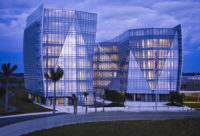Despite some improvement in the volume of new contracts, the Southeast's construction market remains a fraction of the size it was during the pre-recession peak years. While specialty contractors working in Florida, Georgia and the Carolinas are growing more optimistic about market recovery, for many, the next wave of construction can't get here soon enough.


"Things are picking up, but not at the rate we prefer after such a bad downturn," says Dean Gwin, president and COO of Jacksonville, Fla.-based concrete contractor Gate Precast Co.
According to McGraw Hill Construction, publisher of Engineering News-Record, there is uneven recovery in the four-state region. North Carolina construction contracts have stumbled through the first half of 2013, with just over $7.3 billion in new construction starts through June, 8% lower than the same period last year. The decline resulted from a 53% downturn in nonresidential contracts, along with a 26% drop in the volume of new infrastructure contracts.
On the other hand, overall volume of new Florida construction contracts increased by 12% during the first half of 2013—fueled mostly by a resurgent residential market—for a roughly $16-billion tally so far. That increase comes on top of an estimated $27.5 billion in new work during 2012.
Additionally, through July, McGraw Hill estimates new construction contracts for Miami-Dade, Broward and Palm Beach counties are 24% ahead of last year.
In Atlanta, the value of new contracts during the first half of 2013 is up 69% over last year, according to McGraw Hill. Atlanta's construction revival is more recent than Florida's, so this uptick in contracting volume hasn't yet fully translated into actual work.
Specialty contractors indicate that they need all of these contracts, and more, to get back up to speed.
"The first and second quarters have been a lot better, and we've picked up a lot of work," says David Deese, president of Winter Park, Fla.-based Quinco Electrical, ranked fourth on this year's Top Specialty Contractors ranking. Deese, whose firm has been keeping busy with the $300-million Veterans Administration hospital project in Orlando, says that Florida's education and retail sectors—both of which have been down and nearly out since the recession struck—are once again showing signs of life. Health care work and hospitality also show promise, contractors say.
Still, Deese says, construction activity for Quinco in Florida is "lagging" behind other states where work is more robust, such as Georgia and Texas.
Gwin agrees that Florida needs to pick up the pace. From his vantage point, the Sunshine State appears to be "dragging behind other Southeast states."
"We really need Florida to continue to improve, and at a faster rate," he says.
Since the downturn, many specialty firms have continued to struggle to maintain their financial viability, with subcontractor defaults becoming more common. Unfortunately for these firms, it's still a tight market.
Increases in materials prices are starting to add to the challenge of estimating a job for Southeast specialty firms, say contractors.
"We are starting to see price increases from vendors that seem to outpace the recovery on our end," says Gwin. Additionally, while contractor profit margins remain tight, "payment terms and retainage hold times have not improved," he says. "This can be tough on cash flow."








Post a comment to this article
Report Abusive Comment